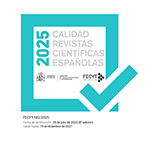Flanqueando el procesualismo y post-procesualismo: Arqueología, teoría de la complejidad y la filosofía de Gilles Deleuze
Resumen
La aplicación de la filosofía de Gilles Deleuze en el ámbito arqueológico permite superar la dicotomía entre procesualismo y posprocesualismo, abriendo la puerta a un pensamiento diferente. Su teoría facilita la recepción de las ideas de las diferentes teorías de la complejidad, gracias a su carácter realista y a la priorización de la ontología sobre la epistemología. Este movimiento nos permite superar el giro simétrico y las distintas oposiciones binarias que subyacen al pensamiento arqueológico, como estructura-proceso, sujeto-objeto, verdad-valor o identidad-diferencia. A la vez, intentamos replantear algunas esferas de la disciplina arqueológica a través de una crítica de su conformación interna y externa, con lo que intentamos abrir el espectro de interpretaciones arqueológicas posibles.Descargas
Descarga artículo
Licencia
La revista Complutum, para fomentar el intercambio global del conocimiento, facilita el acceso sin restricciones a sus contenidos desde el momento de su publicación en la presente edición electrónica, y por eso es una revista de acceso abierto. Los originales publicados en esta revista son propiedad de la Universidad Complutense de Madrid y es obligatorio citar su procedencia en cualquier reproducción total o parcial. Todos los contenidos se distribuyen bajo una licencia de uso y distribución Creative Commons Reconocimiento 4.0 (CC BY 4.0). Esta circunstancia ha de hacerse constar expresamente de esta forma cuando sea necesario. Puede consultar la versión informativa y el texto legal de la licencia.










